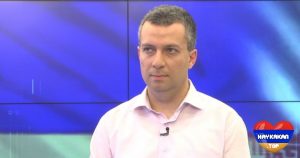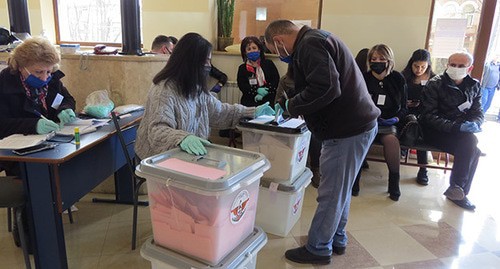On March 31, 2020 presidential and parliamentary elections were held in unrecognized Nagorno Karabakh Republic. Five parties entered the Parliament, while President was elected during the second round, on April 14. The winner of the Presidential campaign was Arayik Harutyunyan, who received 49 percent of votes during the first round and 88 percent during the second round. However, his main contender Masis Mayilyan de facto boycotted second round asking his supporters not to participate in elections due to the COVID – 19 outbreak.
Arayik Harutyunyan’s political party received 40 percent votes in Parliamentary elections and will have 16 MPs in 33 members Parliament. The other parties which entered parliament are led by Samvel Babayan (9 MPs), Vitali Balasanyan (3 MPs), Ashot Ghulyan (2 MPs) and the Armenian Revolutionary Federation (3 MPs). Notably, the electoral bloc supporting Masis Mayilyan failed to overcome the threshold and enter the parliament.
The elections had three main dimensions – domestic political struggle within Karabakh, the context of Armenia – Karabakh relations and the wider geopolitical implications.
Domestic politics
Despite its close political, security and economic ties with Armenia, which is the guarantor of Karabakh security, NKR has its own domestic political processes. The incumbent President, Bako Sahakyan was elected and re-elected in 2007 and 2012 by popular vote and for three year additional term by the Parliament in 2017 as a result of Constitutional amendments. Before taking Presidential office Mr. Sahakyan was the Karabakh Interior Minister in 1999 – 2001 and Director of the National Security Service in 2001 – 2007. Thus, he has a strong background in law enforcement agencies which many view as significant advantage given the “no peace no war” situation with Azerbaijan. Despite the small population and the permanent threat of the resumption of large scale hostilities, the political opposition was always active in Karabakh. In August 2004 the opposition candidate was elected as the Mayor of capital Stepanakert, which was remarkable event given the political realities of neighboring Armenia and Azerbaijan. In both 2007 and 2012 elections Bako Sahakyan had to compete with opposition candidates. In 2007 he received the 85 percent of votes, while his main contender Masis Mayilyan’s result was 12.5 percent. In 2012 Bako Sahaykan received 67 percent of votes, while Vitali Balasanyan’s result was 32.5 percent.
We have to mention that Armenian leadership has always played a key role in Karabakh elections, in the sense that no one directly opposing Yerevan had real chances of victory. However, there always was a struggle between candidates and forces that all had working relations with Yerevan. In 2020 elections domestic politics played a role too. After the 2018 “Velvet revolution” in Armenia it was obvious that incumbent President Bako Sahakyan had no option to be re-elected in 2020, though 2017 constitutional amendments provided him that possibility. In such situation Mr. Sahakyan decided to support Arayik Harutyunyan, his Prime and then State Minister in 2007 – June 2018 and advisor in July 2018 – February 2019. Given the large business interests of Mr. Harutyunyan, who is the richest man in Karabakh, he was supported not only by the large part of political, but also business elites of Karabakh. However, as everywhere in the world, there are no 100 percent monolith elites in Karabakh. The key contenders of Mr. Harutyunyan, incumbent Foreign Minister Masis Mayilyan and the former secretary of Karabakh Security Council General Vitali Balasanyan had their supporters within smaller circles of elites.
Another key factor in domestic political dimension was the participation in elections of former Karabakhi Defense Minister Samvel Babayan. Babayan is a quite controversial figure. He was the de facto strong-man of Karabakh in the 1990s and indirectly participated in the 1999 Parliamentary elections of Armenia de facto controlling one of the parliamentary factions there. However, he was arrested and accused of organizing an assassination attempt against then Karabakh President Arkadi Ghukasyan in March 2000, but was pardoned by the latter in 2004. The Babayan disappeared from the active politics till the April 2017 Parliamentary elections in Armenia when he emerged as a supporter of one of the opposition alliances. Babayan was arrested in March 2017, weeks before Election Day, and was released in June 2018 after the Velvet revolution. He made efforts to participate in 2020 Presidential elections and was seeking to amend the Karabakh constitution for that end, but after failure established a political party, which was quite successful during Parliamentary elections. The main voters of Babayan were dissatisfied parts of Karabakh society, who hoped that Babayan could take some tough measures against incumbent authorities in case of the victory.
Thus, domestically the Karabakh elections have allowed the key parts of the political and economic elite to consolidate their power and secure themselves from unexpected turbulences.
Armenia – Karabakh relations
Yerevan has always exerted a great influence on Karabakh politics. In 1998 – 2018 when Armenia was governed by former Karabakh leaders Robert Kocharyan and Serzh Sargsyan, this influence was enforced through personal connections and shared background. The latter element disappeared in May 2018, as Armenian new leader Nikol Pashinyan had no personal involvement in Karabakh war and no shared connections with Karabakh leadership. Moreover, his tough criticism of second and third Presidents of Armenia, as well as arrest and ongoing trial of Robert Kocharyan has put strains in his relations with Karabakh elites. Bako Sahakyan, alongside with former Karabakh President Arkadi Ghukasyan appeared in the court and presented personal guarantees for Kocharyan’s release in May 2019 which raised controversial feelings among Armenia’s new leadership.
Meanwhile, Armenia, as the only guarantor of Karabakh security, continues to exert influence over Stepanakert, and this fact is well known to both Pashinyan and Karabakhi leadership. In months prior to 2020 elections both Masis Mayilyan and Arayik Harutyunyan were seeking to portrait themselves as ‘Pro – Pashinyan” candidates, while Vitali Balasanyan was harshly criticizing Pashinyan’s position on Karabakh negotiations and was widely perceived as pro – Kocharyan candidate.
Given the fact that Arayik Harutyuyan was promoted to the upper echelons of Karabakh leadership by both Kocharyan and Sargsyan, conventional wisdom was telling that Mayilyan should be Pashinyan’s natural choice. However, in that case Pashinyan would put himself in odds with most part of Karabakh elites, who were behind Harutyunyan. In that scenario, Karabakh leadership might throw their support fully behind Balasanyan, whose election was the worst scenario for Pashinyan. Meanwhile, election of Harutyuyan was acceptable not only for Bako Sahakyan but also for Serzh Sargsyan. Thus, we may assume that most probably a deal was made between Serzh Sargsyan, Nikol Pashinyan and Bako Sahakyan to support Arayik Harutyunyan. Through this arrangement Bako Sahakyan and Serzh Sargsyan secured their influence in Karabakh for at least short term perspective, while Pashinyan thwarted election of Balasanyan and potential strengthening of Kocharyan’s position there.
Geopolitical implications
Geopolitics was inextricable part of Karabakh elections. Immediately after the “Velvet revolution” part of Pashinyan’s and then Mayilyan’s supporters were arguing that Russia was viewing Karabakh as a last stronghold of Russian influence among wider Armenian politics. According to that narrative, Russia would do everything possible to keep Karabakh under its control and use it as a launch pad for the fight against new Armenian leadership. Thus, through Russian involvement, Karabakh will be transformed into the cradle of “Anti revolutionary forces” which then will export anti revolution to Armenia itself.
This logic presumes that Russia will never trust Pashinyan and will systematically weaken his positions with final goal of ousting him from power. These circles view both Harutyunyan and Balasanyan as ‘Russian puppets” and argue that they were supported by both Kocharyan and Sargsyan and they don’t see any significant difference between them. They are sure that only Mayilyan’s election could thwart Russia’s plans and they criticize Pashinyan for making a deal with Bako Sahakyan and Serzh Sargsyan and thus allowing “pro – Russian anti revolutionary forces to get ground in Karabakh”. Interestingly, several weeks before the elections news was disseminated that Russian security services banned Mayilyan’s entry to Russia as “he was threat to Russian security”. Mayilyan vehemently rejected this information calling it “fake news”. However, this information thoroughly fits into “Mayilyan vs Russia supported counter – revolution forces” narrative. It also should be noted that some in Karabakh were mentioning Mayilyan’s close relations with “Pro – western and anti Russian forces’ among Armenian new leadership arguing that Mayilyan’s election will harm Armenia – Russia relations and will bring significant anti – Armenian changes in Russian position on Karabakh.
It’s really difficult to assess the real scope of geopolitics in Karabakh elections. There are almost no reliable sources of information and all predictions are based either on rumors or personal opinions. Meanwhile, looking into broader specter of Russian – Armenian relations after the “Velvet revolution” it should be noted that Pashinyan is doing his best to prove that he has no “hidden anti Russia agenda and that there was no color in April 2018 events”. However, the truth is that many in Armenian government prior to their state career were famous for their anti Russian views and statements and obviously, no one in Kremlin has forgotten this. Meanwhile, this fact is not sufficient to argue that Russia has perceived Mayilyan as a threat or is going to put pressure on Pashinyan through her proxies in Karabakh. At the end of the day, Russia has significant leverages over Armenia to make necessary adjustments there without looking towards Stepanakert for support.

Dr. Benyamin Poghosyan, Chairman, Center for Political and Economic Strategic Studies





